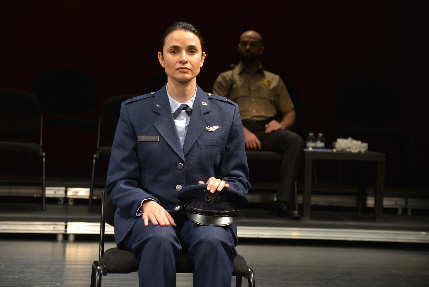
Mia Maestro is the embattled Air Force pilot in Terror at Miami New Drama / Photo by Manny Hernandez
By Bill Hirschman
In a chilly sleek courtroom as clinical as a laboratory dissection tray, thousands of human lives, morality, principles and the law are piled on opposite pans of the scale – except it’s not blind justice holding the scales, but we in the audience.
The patrons’ verdict is restricted to the binary guilty or not guilty, but the issues incisively explored are decidedly more complex than the charges are laid out in Miami New Drama’s intellectually-challenging courtroom drama Terror, having its American premiere.
Outright passion only interferes once with the parade of logical arguments made by lawyers directly to the audience sitting as the jury and which will be required to vote near the end of the play, actually deciding how the remainder of the play will end.
But the proceedings are far from dry – the knotty conundrum is charged with emotion. Terrorist have hijacked a commercial airplane travelling from Miami to Los Angeles with 164 people on board. The plane is hurtling toward an Atlanta arena where 50,000 people have gathered for a baseball game. Air Force pilot Lt. Diana Salazar tries to deflect the plane to no avail. She shoots down the passenger jet despite a decision in the Pentagon not to take any action. As the play begins, the pilot is put on trial for murder. At the end of the evidence and closing arguments, the audience turns in ballots, which are tabulated and determine the judge’s closing address.
While viewers might make a knee-jerk decision one way or the other, playwright Ferdinand von Schirach quickly reveals that that the issues are far more intricate than just weighing numbers. Witnesses including the pilot and the widow of one of the victims testify, and attorneys circle and spar with increasingly conflicting concepts. For instance, the prosecutor asks Lt. Salazar, pained but feeling justified in her judgment call, “What if it had been your husband and child on that plane; would you have taken the same action?”
Concepts fly about personal responsibility, obedience to laws and overarching principles, whether one human life as precious as another or many others, are the terrorists really the responsible parties for what the pilot did, should the answers differ in a world where terrorists threaten to strike anywhere at any time, and many other questions that echo back to Sophocles’ Antigone and the Nuremberg trials. Closing arguments invoke dueling ideas from sources as insightful as philosopher Immanuel Kant.
The end result is a night of theater that intentionally does not elicit raging emotions in the audience, but stimulates their thinking. It likely will result in discussions on the ride home that will recollect those midnight debates in the dorm.
Terror was only written in 2015 by established novelist but first-time playwright Ferdinand von Schirach. But the play already has had at least 59 productions with more than 900 performances, mostly in Germany but also Denmark, Austria, Israel and Japan. A crucial piece of context is that von Schirach is a former lawyer whose professional and artistic life has dealt with the fact that his grandfather was an early leader of the Hitler Youth movement.
The production was helmed by the two-time Tony winning director Gregory Mosher, whose 200 credits include work at the Goodman Theatre in Chicago and Lincoln Center. The German script was translated into English by Davis Tushingham, but Mosher spent three months adapting it, mostly making it fit the American process of jurisprudence. But in trying to place the questions in the context of an uncertain world, he cites painfully fresh references to the Pulse shooting in Orlando and the killings at Fort Lauderdale airport.
As a director, his staging is not showy. Movement is restricted mostly to the judge and the lawyers walking around occasionally to address the audience in the auditorium and about 40 people sitting on stage. Other than the widow played by the affecting Rita Joe, he insists that no one succumb to outsized emotions. But the internal feelings roiling inside can be seen even on the stony demeanor of Mia Maestro as the pilot or heard in the halting speech of her commander played by Gregg Weiner.
The proceedings are fairly and coolly overseen by a judge portrayed by veteran stage actress Maria Tucci (you know her face from appearances in seven Law & Order franchise episodes). Peter Romano is the combative defense attorney and Pascale Armand is the rational prosecutor.
The production adds touches such as creating a memorial wall in the lobby displaying photographs of the 164 “victims” and people at the ticket window lobbying for different outcomes with small flyers saying “A murderer is always guilty,” “justice for the victims” and “Lt. Salazar is an American hero.” The very simple set is dominated by a large gold seal saying “Department of Justice.” Those curious how the crowd voted in past productions and in total from around the world can go to the playright’s website http://terror.theater/en.
The offering exemplifies the social commitment of Miami New Drama, which has only produced two other plays since surfacing a year ago at the Colony Theatre of which it is now managing. If it doesn’t stir the heart, it puts the brain to work.
Terror runs through Feb. 19 from Miami New Drama at the Colony Theatre, 1040 Lincoln Road, Miami Beach. 8 p.m. Thursday-Saturday. 3 p.m. Sunday. Tickets $39-$60. Runs about 1 hour 45 minutes with one intermission. For tickets, visit colonymb.org/terror or 800-211-1414
To read a feature story about the production, click here.







 A PaperStreet Web Design
A PaperStreet Web Design
